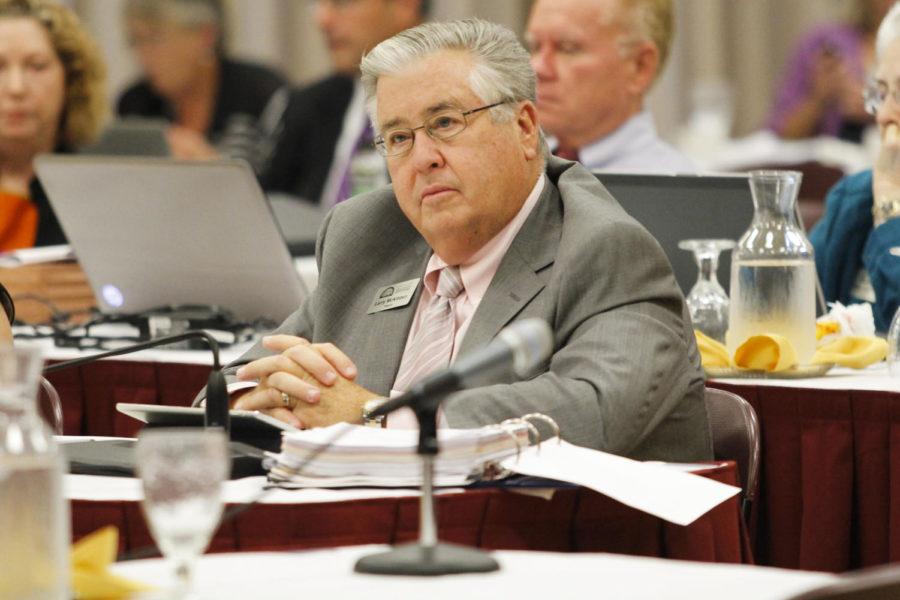Regents discuss possible tuition increase
Regent Larry McKibben listens to speakers during the Iowa Board of Regents meeting Sept. 10 in the Sun Room of the Memorial Union.
October 24, 2014
The Board of Regents is suggesting an increase in tuition and mandatory fees for the 2015-16 academic year, but multiple board members spoke out against the increase, saying they want to freeze tuition for a third year.
The regents had a first reading of proposed tuition and mandatory fee rates, which were proposed to increase next academic year, at the Oct. 23 meeting in Iowa City. Resident undergraduate tuition has been frozen for the past two years, but is proposed to increase by 1.75 percent, or $116, for resident undergraduates, translating to a $13 increase per month.
Iowa ranks sixth highest in the nation in terms of students graduating with debt. Iowa State students, on average, graduate with the highest debt of Iowa’s regent universities at just less than $30,000.
“The debt at sixth in the nation is a social and economic negative for our state,” Regent Larry McKibben said. “[It is important for] students to graduate without having a tremendous amount of debt, to be able to get married, have a family and maybe make a first down payment on a house and stay in Iowa.”
McKibben said he is going to make a motion to freeze tuition at the December meeting, when the board is scheduled to vote on rates.
“It’s not enough to say we’re flat and we’ll just be content at staying the sixth highest in the nation,” McKibben said. “Absolutely and unequivocally unacceptable. We can do better.”
On average, tuition has increased by three percent in Iowa every year, compared to 5.4 percent around the rest of the nation. Resident undergraduate tuition has stayed steady at $6,648 for the since fall 2012 because of two tuition freezes, a move that hadn’t happened since the 1970s.
Regent Ruth Harkin and Regents President Bruce Rastetter agreed with McKibben. Harkin mentioned cost-cutting attempts with the efficiency review could also help keep tuition frozen.
“As we learn more about the opportunity in efficiency savings, it really brings into my mind the question, ‘Why are we raising tuition?’” Rastetter asked.
The ISU Government of Student Body President, Hillary Kletscher, shared opinions from her constituents with the regents. Students understand that higher education comes at a cost, she said, but more should be done to help students maintain debt.
“It’d be great to see another tuition freeze,” Kletscher said. “We understand we’re getting a great education at a great price. Still, more can be done.”
Sen. Herman Quirmbach, D-Ames, said he hopes the Iowa House and Senate can work with the board to freeze tuition for a third year.
“We agreed that we would have as a goal a third year of a tuition freeze,” Quirmbach said. “The truth of the matter is, that increasing state funding, we will reduce the pressure of tuition increases for everybody.”
Last year, the regents asked for and received a 4 percent increase in funding from the state, which is about $24 million. The regents, in return, agreed to freeze tuition.
The University of Northern Iowa Student Body President, Kevin Gartman, however, said the UNI student body is in support of the tuition increase, and suggested tuition increases by small, yearly increments, rather than another tuition freeze. Almost 90 percent of UNI’s enrollment is Iowan, making UNI more dependent on state funding.
“They support the increase because they understand, that without it, UNI faces even greater funding challenges, which can negatively impact the quality of the education the university is able to provide,” Gartman said.
Kletscher said if tuition were to increase, students would understand small increments, but she also said students expressed concern about future costs for families.
“If we are going to have an increase in tuition, we want that to be incremental,” Kletscher said. “We want that to be something families can afford throughout the time their students are enrolled and getting an education.”
Another concern was the gap between in-state and out-of-state tuition. McKibben said the board will look at other states’ rates and look more into numbers.
Regent Hannah Walsh said out-of-state students are also important to Iowa’s economy.
“It is so important that we are educating Iowans, but it’s also important that [out-of-state] students are also being recognized for the great things they are doing for each of our universities,” Walsh said. “They bring income into our state. They also bring a diversity of opinion. They are a great asset to our university.”
The regents are scheduled to vote on tuition and fee rates at the Dec. 3 meeting.

















